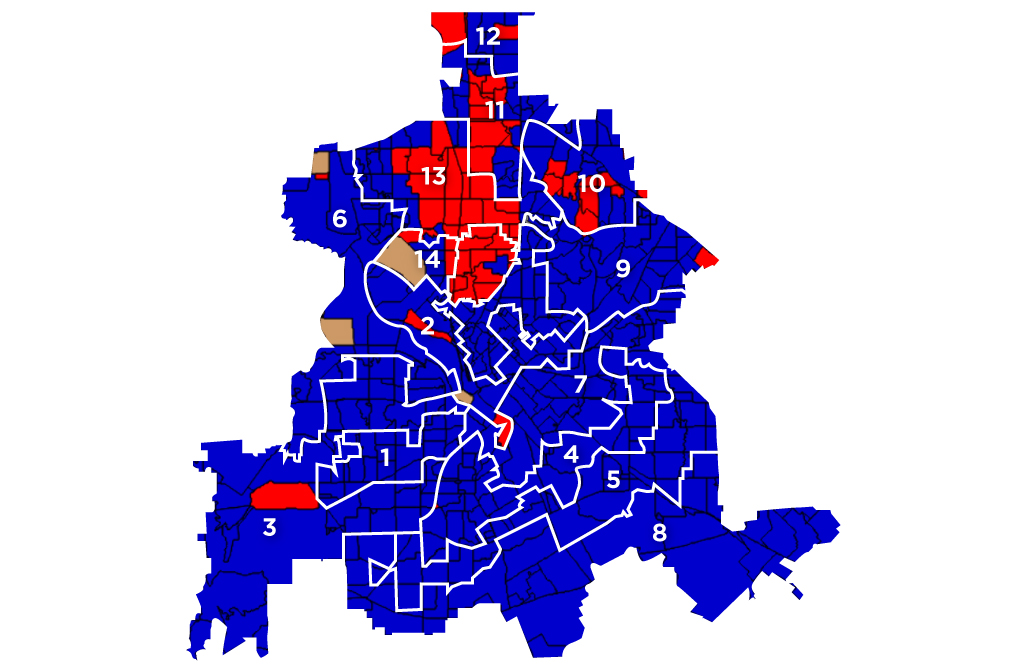In the midterms, in what some have called a perfect storm for Texas voter turnout, Dallas County voters arrived at the polls in droves. Some 732,000 people cast ballots, up from 411,000 during the 2014 midterms. A vast majority of them went blue, including nearly 65 percent of the straight-party ballots. Star Democrat Beto O’Rourke took 66 percent of the vote. Colin Allred (D) flipped TX-32 from long-time congressional incumbent Pete Sessions (R).
The blue stamp has caused folks at the local level to turn their attention to May, toward a mayoral election for which candidates are just now starting to officially file for treasurers and announce their runs. Mayoral races are nonpartisan, meaning there is no party label on the ballot, but that doesn’t keep candidates’ primary voting records or ties to political organizations from spilling out into the public sphere. If a mayoral candidate voted in the Republican presidential primary, there’s nothing keeping their opponent from pointing that out.
And besides, right now, we’re in uncharted territory.
“Because we’re in the most divisive political atmosphere that we’ve ever been in—at least in the 20 years I’ve been working in politics—I think it’s going to play a major role,” says Jay Pritchard, a Dallas-based political consultant.
Dallas’ mayoral races haven’t traditionally been ultra-partisan affairs. Even during more recent elections, as the county has drifted to the left, Republican candidates have been able to compete, says Matthew Wilson, an associate professor of Political Science at SMU. A little more than a decade ago, Republican Tom Leppert was elected mayor in a race in which his candidate made political affiliations an issue.
“[Leppert] was able to build a cross-racial coalition and develop some real support in South Dallas in a way that would’ve been much harder to do if he had the ‘R’ next to his name on the ballot,” he says.
But that was 2007.
“If someone is clearly identified as a Republican, it’s going to be a much steeper uphill climb than it would’ve been 10, 15 years ago,” says Wilson.
The aforementioned perfect storm includes a Republican president, still in office, whose politics and persona continue to engage young people, albeit in the other direction. But they were engaged in 2008, too, when President Barack Obama spurred them out to the polls. That didn’t translate to local elections, says Brian Mayes, a local political consultant who will have a candidate in May (one he’s not quite ready to name).
“If you look at the hard data, it’s still the same group of voters that sway these elections, which tend to be older voters,” says Mayes. This election will come down to “which candidate will have an inspiring message” that gets people out to the polls. Any middle-of-the-road Republican or Democrat stands a chance, he says.
Mari Woodlief—a consultant who ran the campaign of former Republican District Attorney Susan Hawk and was the chief strategist for the campaign of Mayor Mike Rawlings, a Democrat—agrees that Dallas’ local elections bring out different demographics and don’t follow the partisan voting patterns of midterms. She does point to one uprising during the 2017 municipal elections, when a Trump-resisting group organized under indivisible.org accounted for an extra 1,000 or so votes in places like East Dallas and the M Streets.
“In the municipal elections, I think it’s less about partisanship and more about Trump resistance,” she says.
But there’s a third scenario for midterm impact that falls outside discussions of whether those results will push the mayoral race into more partisan territory. Craig Murphy, of the large consulting firm Murphy Nasica, points at the number of independents created during the midterms—that’s how he refers to the people driven to the polls for the first time because of Beto O’Rourke. He says the mayoral candidates who best find these people, target them, and get them out will have the best shot in May.
“You’re going to see a massive, massive vote for Dallas mayor, a record vote in volume,” says Murphy. “It’ll be driven by the fact that once activated, it’s easier to activate them again.”
There’s more incentive than ever for a mayoral candidate with liberal ties to tout their Democratic bonafides—and to point at their opponents Republican ones—in an effort to get those new voters back out and keep them blue.
Just about everyone agrees on this: someone will try it. Whether it will work is anyone’s guess.





